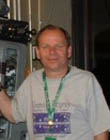|
|
 
|
|
Author
|
Topic: Marni Nixon, the Singing Voice Behind the Screen, Dies at 86
|
Paul Mayer
Oh get out of it Melvin, before it pulls you under!

Posts: 3836
From: Albuquerque, NM
Registered: Feb 2000
|
 posted 07-25-2016 11:13 AM
posted 07-25-2016 11:13 AM





From this morning's NYT:
quote:
Marni Nixon, the Singing Voice Behind the Screen, Dies at 86
By Margalit Fox
JULY 25, 2016
Marni Nixon, the American cinema’s most unsung singer, died on Sunday in Manhattan. She was 86.
The cause was breast cancer, said Randy Banner, a student and friend. Ms. Nixon, a California native, had lived in Manhattan, on the Upper West Side, for more than 40 years.
Classically trained, Ms. Nixon was throughout the 1950s and ’60s the unseen — and usually uncredited — singing voice of the stars in a spate of celebrated Hollywood films. She dubbed Deborah Kerr in “The King and I,” Natalie Wood in “West Side Story” and Audrey Hepburn in “My Fair Lady,” among many others.
Her other covert outings included singing for Jeanne Crain in “Cheaper by the Dozen,” Janet Leigh in “Pepe” and Ida Lupino in “Jennifer.” “The ghostess with the mostest,” the newspapers called her, a description that eventually began to rankle.
Before her Hollywood days and long afterward, Ms. Nixon was an acclaimed concert singer, a specialist in contemporary music who appeared as a soloist with the New York Philharmonic; a recitalist at Carnegie, Alice Tully and Town Halls in New York; and a featured singer on one of Leonard Bernstein’s televised young people’s concerts.
Her concerts and her many recordings — including works by Schoenberg, Stravinsky, Webern, Ives, Copland, Gershwin and Kern — drew wide critical praise. Yet as late as 1990, decades after Ms. Nixon had made good on her vow to perform only as herself, she remained, in the words of The Los Angeles Times, “the best known of the ghost singers.”
At midcentury, Hollywood was more inclined to cast bankable stars than trained singers in films that called for singing. As a result, generations of Americans have grown accustomed to Ms. Nixon’s voice, if not her face, in standards like “Getting to Know You,” from “The King and I”; “I Feel Pretty,” from “West Side Story”; and “I Could Have Danced All Night,” from “My Fair Lady.”
Deborah Kerr was nominated for an Academy Award in 1956 for her role as Anna in “The King and I”; the film’s soundtrack album sold hundreds of thousands of copies. For singing Anna’s part on that album, Ms. Nixon recalled, she received a total of $420.
“You always had to sign a contract that nothing would be revealed,” Ms. Nixon told the ABC News program “Nightline” in 2007. “Twentieth Century Fox, when I did ‘The King and I,’ threatened me.” She continued, “They said, if anybody ever knows that you did any part of the dubbing for Deborah Kerr, we’ll see to it that you don’t work in town again.”
Though Ms. Nixon honored the bargain, her work soon became one of Hollywood’s worst-kept secrets. She became something of a cult figure, appearing as a guest on “To Tell the Truth” and as an answer to clues featured by “Jeopardy!,” Trivial Pursuit and at least one New York Times crossword puzzle.
Her increasing renown helped bring her spectral trade into the light and encouraged her to push for official recognition. “The anonymity didn’t bother me until I sang Natalie Wood’s songs in ‘West Side Story,’ ” Ms. Nixon told The Times in 1967. “Then I saw how important my singing was to the picture. I was giving my talent, and somebody else was taking the credit.”
Although the studios seldom accorded Ms. Nixon the screen credit and royalties that she began to demand, both became customary for ghost singers.
Starting as a teenager in the late 1940s and continuing for the next two decades, Ms. Nixon lent her crystalline soprano to some 50 films, sometimes contributing just a line or two of song — sometimes just a single, seamless note — that the actress could not manage on her own.
The voice of an angel heard by Ingrid Bergman in “Joan of Arc”? It was Ms. Nixon’s.
The songs of the nightclub singer, played by Ms. Kerr, in “An Affair to Remember”? Also Ms. Nixon.
The second line of the couplet “But square-cut or pear-shape/These rocks don’t lose their shape,” with its pinpoint high note on “their,” from “Gentlemen Prefer Blondes”? That was Ms. Nixon too. (The film’s star Marilyn Monroe sang the rest of the number, “Diamonds Are a Girl’s Best Friend.”)
It was a decidedly peculiar calling — and not one on which Ms. Nixon had ever planned — entailing not so much imitating actors as embodying them.
“It’s fascinating, getting inside the actresses you’re singing for,” she told The New York Journal-American in 1964. “It’s like cutting off the top of their heads and seeing what’s underneath. You have to know how they feel, as well as how they talk, in order to sing as they would sing — if they could sing.”
Over time, however, Ms. Nixon came to regard her spectacular mimetic gift as more curse than blessing. For despite her myriad accomplishments as a singer of art songs, she was obliged to spend years exorcising her ghostly cinematic presence.
“It got so I’d lent my voice to so many others that I felt it no longer belonged to me,” she told The Times in 1981. “It was eerie; I had lost part of myself.”
A petite, fine-boned woman who resembled Julie Andrews, Ms. Nixon was born Margaret Nixon McEathron on Feb. 22, 1930, in Altadena, Calif., near Los Angeles.
She began studying the violin at 4 and throughout her childhood played bit parts — “the freckle-faced brat,” she called her typical role — in a string of Hollywood movies. At 11, already possessed of a fine singing voice, she won a vocal competition at the Los Angeles County Fair and found her true calling. She became a private pupil of Vera Schwarz, a distinguished Austrian soprano who had settled in the United States.
At 17, Ms. Nixon appeared as a vocal soloist with the Los Angeles Philharmonic under Leopold Stokowski, singing in Orff’s “Carmina Burana.” She later studied opera at Tanglewood with Sarah Caldwell and Boris Goldovsky.
During her teenage years, Ms. Nixon worked as a messenger at Metro-Goldwyn-Mayer. Knowing of her musical ability — she had perfect pitch and was an impeccable sight reader — the studio began recruiting her to furnish the singing voices of young actresses. The work helped pay for Ms. Nixon’s voice lessons.
Her first significant dubbing job was singing a Hindu lullaby for Margaret O’Brien in “The Secret Garden,” released in 1949.
Ms. Nixon did occasionally take center stage, as when she played Eliza Doolittle in a 1964 revival of “My Fair Lady” at City Center in New York. (Ms. Andrews had played the part in the original Broadway production, which opened in 1956.) In 1965, Ms. Nixon was seen on camera in a small role as a singing nun in “The Sound of Music,” starring Ms. Andrews.
On Broadway, Ms. Nixon appeared in the Sigmund Romberg musical “The Girl in Pink Tights” in 1954 and, more recently, in the musical drama “James Joyce’s ‘The Dead’ ” (2000), the 2001 revival of Stephen Sondheim’s “Follies” and the 2003 revival of “Nine.”
Ms. Nixon’s first marriage, to Ernest Gold, a film composer who won an Oscar for the 1960 film “Exodus,” ended in divorce, as did her second, to Lajos Frederick Fenster. Her third husband, Albert Block, died in 2015.
Survivors include her daughters from her first marriage, Martha Carr and Melani Gold Friedman; her sisters Donyl Mern Aleman, Adair McEathron Jenkins and Ariel Lea Witbeck; six grandchildren; and three great-grandchildren. A son from her first marriage, Andrew Gold, a popular songwriter whose hit “Thank You for Being a Friend” became the theme of the NBC sitcom “The Golden Girls,” died in 2011 at 59.
Ms. Nixon’s other onscreen credits include “Law & Order: Special Victims Unit.” In the 1970s and ’80s, she was the host of “Boomerang,” a popular children’s television show in Seattle, where she had made her home for some years before moving to Manhattan.
She also supplied the singing voice of Grandmother Fa in Disney’s animated film “Mulan,” released in 1998. (The character’s spoken dialogue was voiced by the actress June Foray.) She taught for many years at the California Institute of the Arts in Valencia, where she was the founding director of the vocal department.
But it was her work as a ghost that is enshrined forever in the cinematic canon: “West Side Story” won the Oscar for best picture of 1961; “My Fair Lady” won for 1964. Both films remain perennials on television.
Ms. Nixon, who continued singing until she was in her 80s, eventually came to regard her heard-but-not-seen life with affection. She paid it homage in a one-woman show, “Marni Nixon: The Voice of Hollywood,” with which she toured the country for years.
She did likewise in a memoir, “I Could Have Sung All Night,” published in 2006. (The memoir was written with a ghost, Stephen Cole, whom Ms. Nixon credited prominently on the cover and the title page.)
In the few movie musicals made today, directors tend to cast actors who are trained singers (like Meryl Streep in “Into the Woods”) or those whose star power mitigates the fact that they are not (like Helena Bonham Carter in “Sweeney Todd: The Demon Barber of Fleet Street”).
What this means is that the ghost singers who were once a Hollywood mainstay have now, for the most part, become ghosts themselves.
| IP: Logged
|
|
|
|
|
|
|
|
All times are Central (GMT -6:00)
|
|
Powered by Infopop Corporation
UBB.classicTM
6.3.1.2
The Film-Tech Forums are designed for various members related to the cinema industry to express their opinions, viewpoints and testimonials on various products, services and events based upon speculation, personal knowledge and factual information through use, therefore all views represented here allow no liability upon the publishers of this web site and the owners of said views assume no liability for any ill will resulting from these postings. The posts made here are for educational as well as entertainment purposes and as such anyone viewing this portion of the website must accept these views as statements of the author of that opinion
and agrees to release the authors from any and all liability.
|

 Home
Home
 Products
Products
 Store
Store
 Forum
Forum
 Warehouse
Warehouse
 Contact Us
Contact Us




 Printer-friendly view of this topic
Printer-friendly view of this topic










